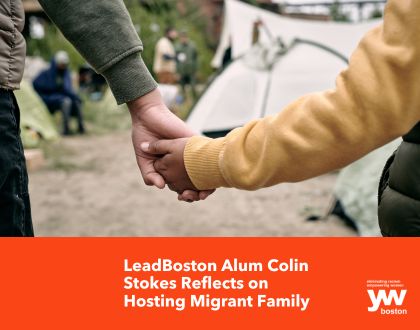
April 4, 2024
By: Ilana Coolidge
LeadBoston Alum Colin Stokes Reflects on Hosting Migrant Family
Colin Stokes (LeadBoston Class of 2018) and his spouse were recently interviewed by CBS news about their decision to host a migrant family in their home. We caught up with Colin to learn more about their experience.
What led you to become a host?
Like all of us, I’ve been following the growing crisis of housing immigrants from Haiti and elsewhere arriving via Texas and Florida with no connections here. The state shelter system is overwhelmed, and Boston Medical Center and Logan Airport are serving as safety nets.
My LeadBoston experience made me more attuned to the housing shortage in the Boston area, and also to the policies that have funneled resources to my suburban town and away from other parts of the city. My wife and I have thought for a while that our large Victorian house would be useful for a refugee family.
Last fall, I happened to see an email calling for volunteers to provide space for refugee families to stay while they awaited long-term shelter. Once the holidays ended and our visiting family had returned home, I called and told them we were ready — and a family of four was en route from Logan within an hour. As soon as they stepped into the room that we’d hastily prepared for them, we knew this was the right thing for us to do.
You’ve been a host for 3.5 months now. What’s that been like for you and your family?
My family has loved this experience. The greatest gift is the chance to get to know our guest family. Their story is harrowing, and their determination is inspiring. We’ve never had more conscientious guests. They’ve cooked a few delicious meals for us. Plus, my wife and I have gotten to practice our French and Spanish.
What was most surprising about the process?
Having worked in under-resourced non–profits, I’m used to need outpacing capacity. But this experience has given me a close-up view of a system we desperately need to invest more in. The small team at the state and its partner agencies are working 24/7, and still have hundreds of families with nowhere to go. They have no time to build systems or document processes — meaning host families like us have no single source for information or support. We’ve gradually put pieces together, gathering donated clothing, Spanish- and Haitian Creole-speaking friends and neighbors, and generous volunteers from own networks to provide more of what the family needs. But there must be more programs and pathways available that we don’t know about.
If someone else was considering becoming a host, what advice would you have for them?
Immigrants have journeyed thousands of miles for a better life. Now they are trying to acclimate to a foreign country without assured safety, privacy, or dignity. If you can share beds, a roof, and a door that closes — for any length of time — you can literally be life-changing for a family.
Still, they face a long pathway to becoming independent. We happen to be able to continue to host at least through the spring, but it is completely up to each host how long they want to set the stay. Families would then go back to short-term shelter in gyms packed with other immigrants. When I hold whatever inconvenience might arise from hosting (in our case, barely any) against the experiences they face, I find it easy to extend the invitation.
I encourage anyone who thinks this might work for them to reach out to Ronnie Millar at the Office for Refugees and Immigrants (617-710-4668).
Colin Stokes is a freelance communications consultant and speaker, focusing on organizational learning about racism and inclusion.
About LeadBoston
Our signature leadership program, LeadBoston, supports all individual participants as they create and implement a leadership commitment. This leadership commitment is an action plan that confronts some of the systemic inequities they’ve learned about and that are showing up in their organization. This plan, and the collective LeadBoston experience, empowers leaders to create meaningful change in their workplaces, in their communities, and in the city of Boston itself. Staff work alongside alums for a year following the program to ensure participants have what they need to see their plan through. Click here to learn more.

